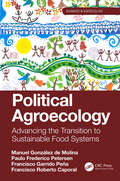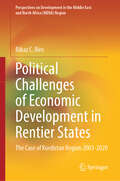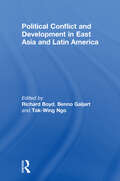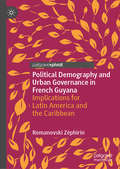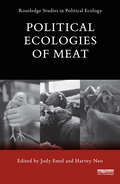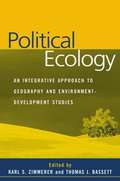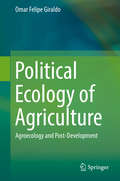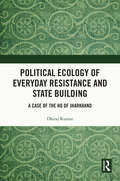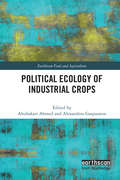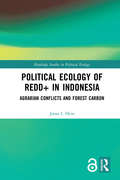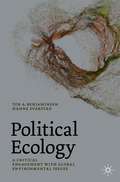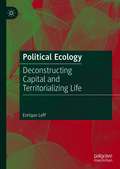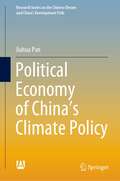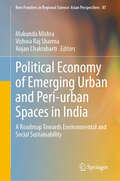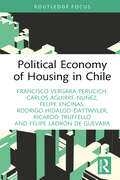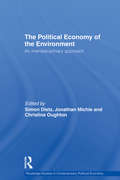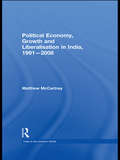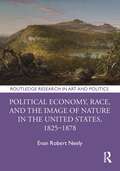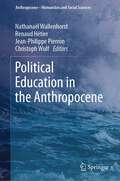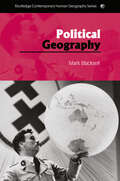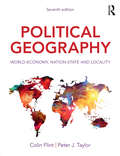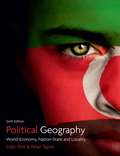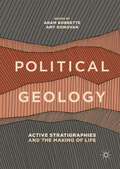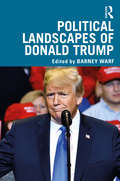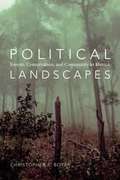- Table View
- List View
Political Agroecology: Advancing the Transition to Sustainable Food Systems (Advances in Agroecology)
by Manuel González de Molina Paulo Frederico Petersen Francisco Garrido Peña Francisco Roberto CaporalPolitical Agroecology is the first book to offer a systematic and articulated reflection on Political Agroecology from the Agroecological perspective. It defines the disciplinary field responsible for designing and producing actions, institutions and regulations aimed at achieving agrarian sustainability. In short, it aims to build a political theory that makes the scaling-up of agroecological experiences possible, turning them into the foundation of a new and alternative food regime. The book proposes theoretical, practical and epistemological foundations of a new theoretical and practical field of work for agroecologists: Political Agroecology. It establishes a framework for a common agroecological strategy, covering the different levels of collective action and the different instruments with which it can be developed. This will be essential reading for agroecologists, environmentalists, farming and food communities, and an ideal textbook for advanced agroecology courses in universities. Key features: Offers a unique state of the art on this fundamental new topic: Political Agroecology Presents a complete introduction to the political and institutional aspects of Agroecology, covering the whole food system Offers an important tool for searching agrarian sustainability Provides a broad epistemological, theoretical and methodological focus, exploring the connection between the different levels and scales involved in agroecological theory and practice
Political Challenges of Economic Development in Rentier States: The Case of Kurdistan Region 2003-2020 (Perspectives on Development in the Middle East and North Africa (MENA) Region)
by Ribaz C. BiroThis book investigates the relationship between politics and economics in rentier states, with a particular focus on the Kurdistan Region of Iraq from 2003 to 2020. Resource-rich states face low levels of economic growth due to the various factors of corruption, weak performance of institutions, poor levels of accountability and transparency in governance, and absence of rule of law. While most previous studies of the topic focus on either the political or economic concerns, this book focuses on their interaction. The book explores the political hurdles in resource-rich states, examining to what extent this impedes economic growth through panel data from 51 rentier states from 2003 to 2020 with different political systems and different types of natural resource dependency. The insights presented in this book have wider implications for understanding and solving similar hurdles in the Kurdistan Region of Iraq and would be a valuable resource for policymakers, strategists, academics, lawmakers, and government officials in implementing sustainable development plans and reducing the negative impacts of natural resource over-reliance in rentier states.
Political Conflict and Development in East Asia and Latin America
by Richard Boyd Tak-Wing Ngo Galjart BennoLong run processes of socio-economic change generate prodigious problems of social conflict and social control, and governments responsible for these processes must therefore manage the resultant conflict. Consequently, the success or failure of a government's management of such conflicts is a crucial factor in development outcomes. This volume investigates the political struggle for development specifically in two vital regions - East Asia and Latin America. This analysis calls into question the dominant emphasis on institutional and cultural bases for stable growth. A careful historical account of the two regions is presented, which permits the rigorous testing of conventional wisdoms regarding development. Of importance to a broad range of academics in the spheres of development studies, politics, political economy and sociology, this book will also make an interesting read for those with a general interest in these areas.
Political Demography and Urban Governance in French Guyana: Implications for Latin America and the Caribbean
by Romanovski ZéphirinThis book analyzes decades of immigration–population growth and rapid urbanization as political-demography and urban-governance issues in French Guyana. Factors such as immigration, population composition and re-composition have sparked patterns of urban relocation across the entire Cayenne agglomeration, affecting urban and housing policy planning, political district redesigns and jeopardizing influential ethno-social and economic groups. Politics and policy conflicts over shifting demography have transcended Guyana to involve France and various neighboring Latin American and Caribbean countries. As well as discussing the demographic and human settlement aspects, the book blends the specific French Guyanese patterns of urbanization–migration into the wider theoretical literature. As such, it will appeal to students, academics, policymakers, journalists, activists and globalists looking for fresh insights into ethno-socio-cultural diversities and inclusive democratic governance at a time when increasing numbers of migrants are settling in urban areas.
Political Ecologies of Meat (Routledge Studies in Political Ecology)
by Harvey Neo Jody EmelLivestock production worldwide is increasing rapidly, in part due to economic growth and demand for meat in industrializing countries. Yet there are many concerns about the sustainability of increased meat production and consumption, from perspectives including human health, animal welfare, climate change and environmental pollution. This book tackles the key issues of contemporary meat production and consumption through a lens of political ecology, which emphasizes the power relations producing particular social, economic and cultural interactions with non-human nature. Three main topics are addressed: the political ecology of global livestock production trends; changes in production systems around the world and their implications for environmental justice; and existing and emerging governance strategies for meat production and consumption systems and their implications. Case studies of different systems at varying scales are included, drawn from Asia, Africa, the Americas and Europe. The book includes an editorial introduction to set the context and synthesize key messages for the reader.
Political Ecology
by Karl Zimmerer Thomas J. BassettThis volume offers a unique, integrative perspective on the political and ecological processes shaping landscapes and resource use across the global North and South. Twelve carefully selected case studies demonstrate how contemporary geographical theories and methods can contribute to understanding key environment-and-development issues and working toward effective policies. Topics addressed include water and biodiversity resources, urban and national resource planning, scientific concepts of resource management, and ideas of nature and conservation in the context of globalization. Giving particular attention to evolving conceptions of nature-society interaction and geographical scale, an introduction and conclusion by the editors provide a clear analytical focus for the volume and summarize important developments and debates in the field.
Political Ecology of Agriculture: Agroecology and Post-Development
by Omar Felipe GiraldoThis study discusses an original proposal aimed at critically analyzing the power relations that exist in contemporary agriculture. The author endeavors herein to clarify some of the strategies that industrial agribusiness, in collusion with the state and multilateral structures, sets in motion in order to functionalize the lives of millions of farmers, so that their bodies, enunciations, and sensibilities can be repurposed in accordance with the dynamics of capital accumulation. The argument is based on the idea that agro-extractivism cannot be thought of exclusively as an economic-political and technological system, but as a complex interweaving of cultural meanings, aesthetics, and affections, which, amalgamated under the abstract name of "development", act as a support for the whole system's scaffolding. The book also explores the other side of the coin, describing how, and under what conditions, social movements are responding to the calamities generated by this model. The central thesis is that many ongoing agroecological processes are providing one of the most interesting guidelines at present for visualizing transitions towards post-development, post-extractivism, and the construction of multiple worlds beyond the sphere of capital. Political ecology of agriculture joins the calls that question the cultural project of modernity and the predatory sense imposed by the globalized food empire, and invites recognition of the importance of agroecology in the context of the end of the fossil-fuel era and the likely collapse of our industry-based civilization.
Political Ecology of Everyday Resistance and State Building: A Case of the Ho of Jharkhand
by Dhiraj KumarResource extraction and conflicts over natural resources are a global phenomenon, including in India. This book explores the process of state formation through developmental intervention in the resource-rich areas of Jharkhand in eastern India which are inhabited by the indigenous Ho community. The cultural practices and livelihoods of Indigenous tribes, like the Ho community in Jharkhand, are deeply linked with the local ecology. The conflict in Jharkhand is intertwined with state development projects and capitalist interventions. This book examines the history of these projects and the issues of territorialisation, dispossession, accumulation, and marginalization which communities have been fighting against for many decades. It examines the process of development policies and projects shaping and restructuring the resource-rich ecology in the region and addresses the interrelated issues of development-induced dispossession, resistance, ecological transformation, governance, illegalities, and state-building. It focuses on the questions: what do development projects bring to the Ho community; what induces them to resist and negotiate; and how state decentralization schemes and local governance in resource conflict areas strengthen State capacities? The book highlights the consequences on the livelihoods and cultural practices of the local people because of ecological transformation and everyday resistance. Comprehensive and important, this book will be of interest to students and researchers of anthropology, sociology, political ecology, social work, development studies, ecology, developmental sociology, indigenous studies, law, and economic anthropology.
Political Ecology of Industrial Crops (Earthscan Food and Agriculture)
by Abubakari AhmedThis book employs a political ecology lens to unravel how industrial crops catalyse ecological, agrarian, socioeconomic, and institutional transformation. Using the conceptual tools and perspectives of political ecology, namely multi-scalar analysis and attention to marginalisation, social difference, and discourses and narratives, this volume provides a critical and comprehensive assessment of the transformative power of industrial cropping systems. It presents a truly international overview by drawing on a range of case studies from the global South, including soybeans in South America, cashew nuts in Guinea Bissau, cotton in India, maize in China, jatropha in Ghana, sugarcane in Peru and Eswatini, and oil palm in Ghana and Peru. The unique case studies are put into perspective with chapters introducing the key concepts of political ecology and critical dimensions of industrial cropping systems related to large-scale land acquisitions, land grabbing, and marginal land. The individual chapters employ different approaches all rooted in political ecology, thus offering a rich overview of how the field engages with such cropping systems. Overall, this volume contains valuable propositions for improving current policies and practices in industrial crop settings in both developed and developing countries. Through its comprehensive and interdisciplinary outlook, this volume will be of great interest to students and scholars of political ecology, agrarian studies, development studies, and ecological economics.
Political Ecology of REDD+ in Indonesia: Agrarian Conflicts and Forest Carbon (Routledge Studies in Political Ecology)
by Jonas I. HeinIndonesia’s commitment to reducing land-based greenhouse gas emissions significantly includes the expansion of conservation areas, but these developments are not free of conflicts. This book provides a comprehensive analysis of agrarian conflicts in the context of the implementation of REDD+ (Reducing Emissions from Deforestation and Forest Degradation) and forest carbon offsetting in Indonesia, a country where deforestation is a major issue. The author analyzes new kinds of transnational agrarian conflicts which have strong implications for global environmental justice in the REDD+ pilot province of Jambi on the island of Sumatra. The chapters cover: the rescaling of the governance of forests; privatization of conservation; and the transnational dimensions of agrarian conflicts and peasants' resistance in the context of REDD+. The book builds on an innovative conceptual approach linking political ecology, politics of scale and theories of power. It fills an important knowledge and research gap by focusing on the socially differentiated impacts of REDD+ and new forest carbon offsetting initiatives in Southeast Asia, providing a multi-scalar perspective. It is aimed at scholars in the areas of political ecology, human geography, climate change mitigation, forest and natural resource management, as well as environmental justice and agrarian studies. The Open Access version of this book, available at http://www.tandfebooks.com/doi/view/10.4324/9781351066020, has been made available under a Creative Commons Attribution-Non Commercial-No Derivatives 4.0 license.
Political Ecology: A Critical Engagement with Global Environmental Issues
by Tor A. Benjaminsen Hanne SvarstadThis textbook introduces political ecology as an interdisciplinary approach to critically examine land and environmental issues. Drawing on discourse and narrative analysis, Marxist political economy and insights from natural science, the book points at similarities, differences and inter-connections between environmental governance in the global North and South. A wide range of carefully curated case studies are presented, with a particular focus on Africa and Norway. Key themes of power, justice and environmental sustainability run through all chapters. The authors challenge established views and leading discourses and present research findings that may surprise readers. Chapters cover topics including wildlife conservation, climate change and conflicts, land grabbing, the effects of population growth on the environment, jihadism in the African Sahel, bioprospecting, feminist political ecology, and struggles around carbon mitigation within a fossil fuel-based economy. This introductory text provides tools and examples for both undergraduate and postgraduate students to better understand on-going struggles about some of the world’s most urgent challenges.
Political Ecology: Deconstructing Capital and Territorializing Life
by Enrique LeffThis book offers a conceptual framework for the critical understanding of the present socio-environmental conflicts. It reflects on the evolution of subject and thought, a shift in environmental thinking triggered by the development of eco-territorial conflicts and the social responses given to the environmental question. Bringing together 40 years of the authors writing and research, the book explores the transition from ecological economics and historical materialism to ecological Marxism. It unpacks the forging of political ecology from value theory in political economy, to ecological distribution and ecologies of difference; a transition to an environmental rationality grounded in the ontology of diversity, a politics of difference and an ethics of otherness. This evolution in thinking gives consistency to a theoretical discourse able to respond to the territorial conflicts generated by the radicalization of the environmental question as a key social issue of our times. The book is a call to respond to the urgent challenge of reversing the tendency towards the entropic death of the planet and to building a sustainable world order.
Political Economy of China’s Climate Policy (Research Series on the Chinese Dream and China’s Development Path)
by Jiahua PanThis book covers major advances in China’s climate policy over the past decade and presents theoretical approaches to climate justice and low-carbon transformation from a Chinese perspective. It analyzes the political economy of China’s climate policy, and subsequently addresses the following major aspects: carbon emissions and human rights, equity and carbon budgets, economic analysis of low-carbon transformation, economics of adaptation to climate change, and international climate regime building.
Political Economy of Emerging Urban and Peri-urban Spaces in India: A Roadmap Towards Environmental and Social Sustainability (New Frontiers in Regional Science: Asian Perspectives #81)
by Anjan Chakrabarti Vishwa Raj Sharma Mukunda MishraThis book addresses the “urban” and “peri-urban” spaces in India within a single frame. The reasoning is that while the former is studied for its transformation towards more value addition in terms of power and neoliberal economic viabilities, the latter is the land of visible transformation of the built environment. It acquaints readers with how the processes of circulation of migrant labour, the shift in occupations of landowning groups, and the residential cohabitation of diverse social groups contribute to re-scripting social relations, green spaces, and the forging of new subjectivities. The chapters of the book speak of the need to create sustainable cities for uncertain futures, with a quest to reverse global climate change and make an effort to halt urbanization at the cost of the natural ecosystem, all of which have become more urgent in the post-pandemic years. The book addresses different aspects of the evolutionary urban and peri-urban spaces in India amidst the conflict of the environmental and social sustainability agendas with the neo-liberal ascendancy. The integration of urban and peri-urban areas with emerging political and economic equations and the involvement of multiple disciplines to work in tandem for a deep insight into the complex phenomena incorporating diverse actors validate the need for such a volume. This edited volume seeks to record how all these stakeholders—state agencies, political leaders, businessmen, workers, investors, households, builders, real estate intermediaries, business owners, migrants, and many more with their varying capacities to influence outcomes on the ground—interact with one another. It also shows how multiple power relationships are calibrated and recalibrated to produce urban and peri-urban spaces in diverse ways in many parts of India.
Political Economy of Housing in Chile (Routledge Studies in Urbanism and the City)
by Francisco Vergara-Perucich Carlos Aguirre-Nuñez Felipe Encinas Rodrigo Hidalgo-Dattwyler Ricardo Truffello Felipe Ladrón de GuevaraThrough the lens of political economy, this book positions housing as a key factor in understanding social inequality. It does so by drawing on rich empirical evidence from the case of the Chilean housing market. This book provides insights on the articulation between real estate development, housing provision and social inequality based on applied urban economics analyses that illustrate the contradictions of neoliberal urbanism through the case of Chile. For neoliberal urbanism, the good city is not equal for all, it is based on the principle of profitability and benefits from segregation to make capital investment more efficient. The chapters of this book expose how these processes are generated by a political system that allows them rather than by the invisible hand of the market. The book will be of interest to graduate students in urban studies, urban planning, sociology and urban geography. It will also appeal to decision-makers and also to actors in the real estate market seeking to perfect the social benefits of their professional activities, aspiring to generate more egalitarian and just cities.
Political Economy of the Environment: An Interdisciplinary Approach (Routledge Studies In Contemporary Political Economy Ser.)
by Jonathan Michie Simon Dietz Christine OughtonThis book is the culmination of several years work by a group of academics, policy-makers and other professionals looking to understand how alternative economic thinking – and indeed thinking from quite different social-scientific disciplines – could enhance the mainstream economic approach to environmental and natural-resource problems. Of the editors, Dietz comes from the mainstream economics tradition, while Michie and Oughton draw explicitly on institutional and evolutionary economics. The various authors represent a range of disciplinary backgrounds and approaches. This book draws on the strengths of each and all of these approaches to analyse environmental issues and what can be done to tackle these through corporate and public policy. The book argues that the need for an inter-disciplinary approach. Two themes which emerge repeatedly throughout the book are the need for an interdisciplinary theory of technological change, and the need for a similarly interdisciplinary approach to the study of human behaviour and how it influences both production and consumption choices. The two themes are of course related. Resolving environmental questions requires an understanding of their nature, of their causes and, to the extent that they are anthropogenic, of how to change human behaviour. These fundamental issues are the focus of the four chapters that form Part 1 of this volume. The remainder of the volume develops them in more detail. .
Political Economy, Growth and Liberalisation in India, 1991-2008 (India in the Modern World)
by Matthew McCartneyThe phenomenal growth and liberalisation of the Indian economy has been the subject of extensive scholarly documentation and competing interpretations. This book examines the key period of liberalisation in India from 1991 to 2008. It analyses the relationship between growth and liberalisation and, in particular, the recent ‘miracle growth rate’ and considers its sustainability in the current Indian economic environment. The book explores and re-evaluates the historical experience of planning in India between 1950 and 1980 as an alternative model of state-led economic development, discusses how far current rapid growth is the result of liberalisation, and how strong the case is for continued liberalisation today. The book is a significant contribution to the growing debate on economic growth and liberalisation, and the broader subject of economic development in India and other developing countries. It will appeal to students, researchers, lecturers and all those interested in South Asia in general and, India, in particular. It is also an essential resource for the study of international political economy and development economics.
Political Economy, Race, and the Image of Nature in the United States, 1825–1878 (Routledge Research in Art and Politics)
by Evan Robert NeelyPolitical Economy, Race, and the Image of Nature in the United States, 1825–1878 is an interdisciplinary work analyzing the historical origins of a dominant concept of Nature in the culture of the United States during the period of its expansion across the continent.Chapters analyze the ways in which “Nature” became a discursive site where theories of race and belonging, adaptation and environment, and the uses of literary and pictorial representation were being renegotiated, forming the basis for an ideal of the human and the nonhuman world that is still with us. Through an interdisciplinary approach involving the fields of visual culture, political economy, histories of racial identity, and ecocritical studies, the book examines the work of seminal figures in a variety of literary and artistic disciplines and puts the visual culture of the United States at the center of intellectual trends that have enormous implications for contemporary cultural practice.The book will be of interest to scholars working in art history, visual culture, American studies, environmental studies/ecocriticism, critical race theory, and semiotics.
Political Education in the Anthropocene (Anthropocene – Humanities and Social Sciences)
by Christoph Wulf Nathanaël Wallenhorst Renaud Hétier Jean-Philippe PierronThis book articulates an educational theory as well as a political theory of the Anthropocene. Divided into three sections it addresses educational anthropology, cultures and institutions, and educational recommendations in the Anthropocene. Topics covered in the volume measure the impact of the idea of the Anthropocene on the type of anthropology that underlies education and on a phenomenology of relationship. It links the notion of the Anthropocene with cultures and institutions so as not to 'smooth out' or erase the latter. Finally, it presents proposals and recommendations for educational practices. The work advocates rethinking education as an essential component in ensuring the sustainability of human life in society - by proposing to go beyond the approach of education for sustainable development or environmental education. The work also brings together empirical contributions in which proposals are elaborated for programs, pedagogical devices and experiments relating to the preparation of the future in the field of education. This volume is of interest to researchers of the Anthropocene.
Political Geography (Routledge Contemporary Human Geography Series)
by Mark BlacksellIn 1904 Sir Halford Mackinder published his seminal paper The Geographical Pivot of History demonstrating the central position of political geography in the study of geography as a whole; a century later and political geography is still at the heart of human geography. Yet over time political geography has experienced many significant ups and downs, eventually recovering to a position of renewed pre-eminence as the last century drew to a close. This fascinating journey, charted by this equally fascinating book, forms a key part of the history of the evolution of spatial science. Beyond a narrative, the book provides an introduction to all the complex elements that constitute political geography today. Organized in three distinct sections, it covers: process and patterns ideology and geopolitical visions beyond the state. Tackling key contemporary issues (such as politics and the local state), as well as more traditional topics (such as state formation and international relations), this thought-provoking book covers the range of theoretical approaches. Including many original maps and diagrams which skilfully illustrate key themes, this book is a concise, student-friendly, pedagogically rich introduction for students of geography, political science and world affairs.
Political Geography: World-Economy, Nation-State and Locality (Routledge Library Editions: Political Geography Ser.)
by Peter J. Taylor Colin FlintThe new and updated seventh edition of Political Geography once again shows itself fit to tackle a frequently and rapidly changing geopolitical landscape. It retains the intellectual clarity, rigour and vision of previous editions based upon its world-systems approach, and is complemented by the perspective of feminist geography. The book successfully integrates the complexity of individuals with the complexity of the world-economy by merging the compatible, but different, research agendas of the co-authors. This edition explores the importance of states in corporate globalization, challenges to this globalization, and the increasingly influential role of China. It also discusses the dynamics of the capitalist world-economy and the constant tension between the global scale of economic processes and the territorialization of politics in the current context of geopolitical change. The chapters have been updated with new examples – new sections on art and war, intimate geopolitics and geopolitical constructs reflect the vibrancy and diversity of the academic study of the subject. Sections have been updated and added to the material of the previous edition to reflect the role of the so-called Islamic State in global geopolitics. The book offers a framework to help students make their own judgements of how we got where we are today, and what may or should be done about it. Political Geography remains a core text for students of political geography, geopolitics, international relations and political science, as well as more broadly across human geography and the social sciences.
Political Geography: World-economy, Nation-state and Locality (Routledge Library Editions: Political Geography Ser.)
by Peter J. Taylor Colin FlintWe live in a rapidly changing world in which politics is becoming both more and less predictable at the same time: this makes political geography a particularly exciting topic to study. To make sense of the continuities and disruptions within this political world requires a strongly focused yet flexible text. This new (sixth) edition of Peter Taylor's Political Geography proves itself fit for the task of coping with a frequently and rapidly changing geo-political landscape. Co-authored again with Colin Flint, it retains the intellectual clarity, rigour and vision of previous editions, based upon its world-systems approach. Reflecting the backdrop of the current global climate, this is the Empire, globalization and climate change edition in which global political change is being driven by three related processes: the role of cities in economic and political networks; the problems facing territorially based notions of democratic politics and citizenship, and the ongoing spectre of war.This sixth edition remains a core text for students of political geography, geopolitics, international relations and political science, as well as more broadly across human geography and the social sciences.
Political Geology: Active Stratigraphies And The Making Of Life
by Adam Bobbette Amy DonovanThis book explores the emerging field of political geology, an area of study dedicated to understanding the cross-sections between geology and politics. It considers how geological forces such as earthquakes, volcanoes, and unstable ground are political forces and how political forces have an impact on the earth. Together the authors seek to understand how the geos has been known, spoken for, captured, controlled and represented while creating the active underlying strata for producing worlds. This comprehensive collection covers a variety of interdisciplinary topics including the history of the geological sciences, non-Western theories of geology, the origin of the earth, and the relationship between humans and nature. It includes chapters that re-think the earth’s ‘geostory’ as well as case studies on the politics of earthquakes in Mexico city, shamans on an Indonesian volcano, geologists at Oxford, and eroding islands in Japan. In each case political geology is attentive to the encounters between political projects and the generative geological materials that are enlisted and often slip, liquefy or erode away. This book will be of great interest to scholars and practitioners across the political and geographical sciences, as well as to philosophers of science, anthropologists and sociologists more broadly.
Political Landscapes of Donald Trump
by Barney WarfThis book delves into the life and work of President Donald Trump, who is arguably the most famous and controversial person in the world today. While his administration has received enormous attention, few have studied the spatial dimensions of his policies. Political Landscapes of Donald Trump explores the geographies of Trump from multiple conceptual standpoints. It contextualizes Donald and his rise to power within the geography of his victory in 2016. Several essays in the book are concerned with his white ethno-nationalist political platform and social bases of support. Others focus on Trump’s use of Twitter, his ties to professional wrestling, and his innumerable lies and deceits. Yet another set delves into the geopolitics of his foreign policies, notably in Cuba, Korea, the Middle East, and China. Finally, it covers how his administration has addressed – or failed to address – climate change and its treatment of undocumented immigrants. This book will be of interest to anyone interested in the Trump administration, as well as social scientists and the informed lay public.
Political Landscapes: Forests, Conservation, and Community in Mexico
by Christopher R. BoyerFollowing the 1917 Mexican Revolution inhabitants of the states of Chihuahua and Michoacán received vast tracts of prime timberland as part of Mexico's land redistribution program. Although locals gained possession of the forests, the federal government retained management rights, which created conflict over subsequent decades among rural, often indigenous villages; government; and private timber companies about how best to manage the forests. Christopher R. Boyer examines this history in Political Landscapes, where he argues that the forests in Chihuahua and Michoacán became what he calls "political landscapes"--that is, geographies that become politicized by the interactions between opposing actors--through the effects of backroom deals, nepotism, and political negotiations. Understanding the historical dynamic of community forestry in Mexico is particularly critical for those interested in promoting community involvement in the use and conservation of forestlands around the world. Considering how rural and indigenous people have confronted, accepted, and modified the rationalizing projects of forest management foisted on them by a developmentalist state is crucial before community management is implemented elsewhere.
